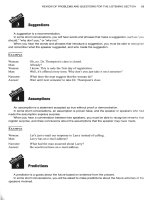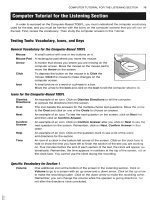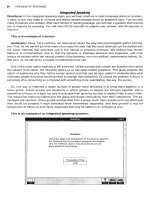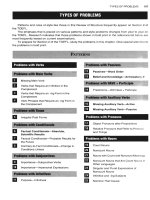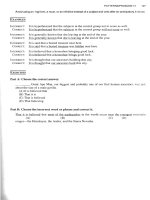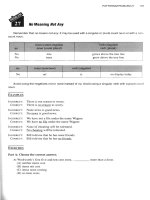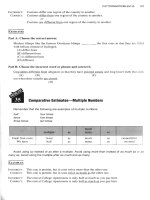Tài liệu How to prepare for the toefl part 61 doc
Bạn đang xem bản rút gọn của tài liệu. Xem và tải ngay bản đầy đủ của tài liệu tại đây (504.73 KB, 10 trang )
MODEL TEST 6 COMPUTER-ASSISTED TOEFL
603
Audio
10. Man: I'll be right back. Can you watch my book bag for a minute?
Woman:
Sure. I'll be glad to.
Narrator: What does the woman agree to do for the man?
Answer
(B)
"Can you watch my book bag?" Choice (D) is not correct because the man wants the woman
to
stay with his book bag. Choices (A) and (C) are not mentioned and may not be concluded from in-
formation in the conversation.
Audio
1 1.
Woman:
I'm really tired of spending every weekend studying.
Man:
I
hear you.
Narrator: What does the man mean?
,,/
Answer
(B)
I
hear
you
is an idiomatic expression that means the speaker "understands" the other person's
point of view. Choices
(A),
(C), and
(D)
are not paraphrases of the expression and may not be con-
cluded from information in the conversation.
Audio
12.
Man: Is that Mike's car?
I
thought you said that Mike was spending spring break in
Florida.
Woman:
That's Mike's brother. He's using the car while Mike's away.
Narrator: What does the woman imply?
Answer
(C)
Since Mike's brother is using the car while Mike is away,
it
must be concluded that Mike
is
in
Florida as planned. Choice
(A)
is not correct because Mike's brother is using his car. Choice (B)
refers to Mike, not to his brother. Choice
(D)
is not correct because Mike's brother is here and Mike
is in Florida.
Audio
13.
Woman: We turned in our project today.
Man: You did? We haven't even started.
Woman: Well, you'd better start working. It's due in a week.
Man:
I will. I'll get it done.
Narrator: What does the woman advise the man to do?
Answer
(C)
"You'd better start working [on that project]." Choice (B) is not correct because the man has not
started yet. Choices (A) and (D) are not mentioned and may not be concluded from information in
the conversation.
604
EXPLANATORY ANSWERS AND AUDIO SCRIPTS
Audio
14.
Man: Do you want to go to the International Talent Show?
Woman: Sure. Why not?
Narrator: What does the woman mean?
Answer
(D)
Why
nor?
is
an
idiomatic expression that means the speaker "agrees" with the other person's
plan. Choices
(A),
(B),
and
(C)
are not paraphrases of the expression and may not be concluded
from information in the conversation.
Audio
15.
Man: Did you know that Bill and Carol are back from their honeymoon?
Woman: So they
did
get married after all.
Narrator:
What had the woman assumed about Bill and Carol?
,
1'
Answer
(A)
Since the woman registers surprise, it must be concluded that she thought the couple would not
get married. Choices
(B)
and (C) are not correct because the woman made her comment about the
wedding, not the honeymoon. The size of the wedding in Choice (D) is not mentioned and may not
be concluded from information in the conversation.
Audio
16.
Man:
Are you going to the review session for the test?
Woman: What's the point?
Narrator:
What does the woman mean?
Answer
(C)
What's
the
point?
is
an idiomatic expression that means the speaker "does not believe that the
suggestion will be helpful." Choices
(A),
(B),
and (D) are not paraphrases of the expression and
may not be concluded from information in the conversation.
Audio
17.
Woman: Your check isn't here.
Man:
Oh no. What can
I
do?
Woman:
I
suggest that you call your sponsor.
Man: Okay.
I'll
be back.
Narrator: What will the man probably do?
Answer
(A)
Since the woman says,
"I
suggest that you call your sponsor," the man will probably do
it.
Choice
(B)
is not correct because the check isn't here. Choices (C) and (D) are not mentioned and
may not be concluded from information in the conversation.
MODEL TEST &COMPUTER-ASSISTED TOEFL
605
QUESTION
DIRECTIONS-Part
B
In Part
B
of the Listening Section, you will hear several longer conversations and talks. Each conver-
sation or talk is followed by several questions. The conversations, talks, and questions will not be
repeated.
The conversations and talks are about a variety of topics. You do not need special knowledge of the top-
ics to answer the questions correctly. Rather, you should answer each question on the basis of what is
stated or implied by the speakers in the conversations or talks.
For most of the questions, you will need to click on the best of four possible answers. Some questions
will have special directions. The special directions will appear in a box on the computer screen.
Audio Conversation
Narrator:
Listen to part of a conversation between two students on campus.
Woman:
Man:
Woman:
Man:
Woman:
Man:
Woman:
Man:
Woman:
Man:
Woman:
Man:
Woman:
Where have you been? I've missed you in lab.
I've been sick.
Nothing serious,
I
hope.
Well, I stayed out of
the
hospital, but to tell the truth,
I
was in pretty bad shape.
Some kind of flu.
That's too bad. Are you better now?
Well enough to start thinking about school again. Now
I'm
worried about getting
caught up.
Let's see, how many labs have you missed?
Margaret,
I
got sick three weeks ago, so
I
am really behind.
Let me look at my notebook. I've got it right here.
Oh, great.
I
was hoping you'd let me make a copy of your notes.
Sure. You can do that,
Gay.
And I have some good news for you. You haven't
missed any quizzes. We haven't had any since you've been gone. Listen, after you
have a chance to look at my notes, why don't we get together?
If
there's anything
you don't understand, maybe
I
can explain it to you. It's hard trying to read someone
else's notes.
That would be perfect.
I
hate to bother you though.
No bother. I'm sure you'd do it for me.
Now get ready to answer the questions
Audio
18.
What is Gary's problem?
Answer
(D)
"I've been sick.
.
. .
Now I'm worried about getting caught up." Choice
(A)
refers to the
fact
that
the man has been sick, but he is not sick now. Choice
(B)
is not correct because he stayed out of the
hospital. Choice (C) is not correct because he has not missed any quizzes.
606
EXPLANATORY ANSWERS AND AUDIO SCRIPTS
Audio
19.
What does Gary want Margaret to do?
Answer
(B)
"I
was hoping you'd let me make a copy of your notes." Choice (C) refers to the offer that she
makes, not to what Gary asks Margaret to do. Choices
(A)
and (D) are not mentioned and may not
be concluded from information
in
the conversation.
Audio
20.
What does Margaret offer to do?
Answer
(A)
". .
.
why don't we get together
.
.
.
[so that]
I
can explain
it
[my notes] to you." Choice
(B)
is
not correct because he hasn't missed any quizzes. Choices (C) and (D) are not mentioned and may
not be concluded frorn information in the conversation.
Audw
21.
What is Margaret's attitude in this conversation?
Answer
(A)
(D)
Since Margaret agrees to let Gary borrow her notes, it must be concluded that she is helpful.
Her attitude is positive and friendly. Choices
(B)
and (C) cannot be concluded from information
in
the conversation.
Audw Lecture
Narrator: Listen to part of a lecture in an American literature class. The professor is talking
about American novelists in the twentieth century. He is focusing on
F.
Scott
Fi tzgerald.
There have been
a
number of important American novelists in this century, but
1
have chosen
F.
Scott Fitzgerald for our class because he is one of the more interesting ones. Born
in
1896
and
educated at Princeton, he wrote novels that describe the post-war American society, very much
caught up in the rhythms of jazz.
In 1920, the same year that he published his first book,
This Side
of
Paradise,
he married
Zelda Sayre, also a writer. His most famous book,
The Great Gatsby,
appeared in 1925.
Fitzgerald had
a
great natural talent, but unfortunately he became a compulsive drinker.
A
brilliant success in his youth, he never made the adjustments necessary to a maturing writer in a
changing world. His later novels,
All
the Sad
Young
Men, Tender
Is
the
Night,
and
The Last Ty-
coon,
were less successful, so that when he died in
1940
his books were out of print and he had
been almost forgotten. His reputation now is far greater than it was in his lifetime, especially
since the film version of his novel
The Great Gatsby
was released.
Now, with that introduction,
I
am going to
run
the video version of
The Great Gatsby,
and
then we'll divide up into groups to talk about it.
I
Now get ready to answer the questions
I
MODEL TEST 6-COMPUTER-ASSISTED TOEFL
607
Audio
22.
What is the main topic of this lecture?
Answer
(B)
The main topic of this talk is
F.
Scott Fitzgerald's work. The other topics are secondary themes
used to develop the main topic.
Audio
23.
Why wasn't Fitzgerald more successful in his later life?
Answer
(B)
(D)
"Fitzgerald had a great natural talent, but unfortunately he became a compulsive drinker.
.
.
.
He never made the adjustments necessary to a maturing writer in a changing world." Choice
(A)
is
not correct because Fitzgerald had a great natural talent. Choice
(C)
is not correct because his repu-
tation is greater since the film version of his novel
The Great Gatsby
was released.
Audio
24.
According to the lecturer, what do we know about the novels written by
F.
Scott Fitzgerald?
Answer
(A)
"He wrote novels that describe the post-war American society
. . .
caught up in the rhythms of
jazz." Choice
(C)
is not correct because his novels describe post-war society, not war experiences.
Choices
(B)
and (D) are not mentioned and may not be concluded from information in the talk.
Audio
25.
What does the professor want the class to do after the lecture?
Answer
(C)
". .
.
I
am going to run the video version of
The Great
Gatsby,
and then we'll divide up into
groups to talk about it." Choices
(A),
(B),
and
(D)
are not mentioned and may not be concluded
from information in the talk.
Audio
Talk
Narrator:
The university quartet has been invited to play for a music appreciation class. Listen
to a talk by the director of the quartet.
Before the concert begins, let me tell you a little bit about chamber music. From medieval
times through the eighteenth century, musicians in Europe had two options for employment-
the church or the nobility. So when they were not performing at religious functions, they were
playing in the chambers of stately homes. And they came to be known as chamber players.
Chamber music is written to be performed by a small group, more than one, but fewer than a
dozen musicians. Pieces for more than eight players are unusual though, and it is rare to see
a
conductor. It may surprise you to know that any combination of instruments can be used for
chamber music. The most popular are the piano, strings, and woodwinds, but chamber music
has been written for other instruments as well.
Early chamber music, let's say the sixteenth and seventeenth centuries, was often written for
the recorder, harpsichord, and viola. During the Elizabethan Period, there were many talented
composers of chamber music, including William Byrd and Orlando Gibbons. And at that time,
vocal chamber music, called madrigal singing, was very popular. Later, both Johann Sebastian
608
EXPLANATORY ANSWERS
AND
AUDIO SCRIPTS
Bach and George Frederick Handel wrote trio sonatas for chamber groups. This evening the
University Quartet will perform two of the later pieces by Bach.
Ladies and gentlemen, the University Quartet.
Now get ready to answer the questions
Audio
26.
What is the main purpose of the talk?
Answer
(A)
". .
.
let me tell you a little bit about chamber music." Choice (B) is a detail used to develop the
main purpose of the talk. Choices (C) and (D) are not mentioned and may not be concluded from
information in the talk.
Audio
27.
What is the origin of the term
chamber music?
Answer
(C)
"So when they were not performing at religious functions, they were playing in the chambers
of
stately homes. And they came to be known as chamber players." The musical instrument in Choice
(A)
might be a recorder, harpsichord, or viola, not chamber music. The musicians in Choice
(D)
refer to Handel and Bach. Choice
(B)
is not mentioned and may not be concluded from information
in the lecture.
Audio
28.
According to the speaker, which instruments are the most popular for chamber music?
Answer
(A)
(C)
". .
.
any combination of instruments can be used for chamber music. The most popular are
the piano, strings, and woodwinds.
.
. .
"
Choices (B) and
(D)
are not mentioned and may not be
concluded from information in the talk.
Audio
29.
Why does the speaker mention Johann Sebastian Bach?
Answer
(B)
"This evening the University Quartet will perform two of the later pieces by Bach." Choices
(A)
and
(D)
are true, but they are not the reason that the speaker mentions Bach. Choice (C)
is
not
correct because Bach wrote music after vocal chamber music was popular.
Audio
30.
What will the listeners hear next?
Answer
(B)
"Ladies and Gentlemen, the University Quartet." Choices
(A),
(C), and (D) are mentioned
earlier in the talk.
MODEL TEST &COMPUTER-ASSISTED TOEFL
609
Audio Conversation
Narrator: Listen to part of a conversation between a student and a secretary in the chemical
engineering department.
Woman:
Man:
Woman:
Man:
Woman:
Man:
Woman:
Man:
May
I
help you?
Yes. My name is Bob Stephens and I have an appointment with Dr. Benjamin at three
o'clock on Wednesday.
Three o'clock on Wednesday? Yes. I see it here on his calendar.
Well,
I
was wondering whether he has an earlier appointment available on the same
day.
I'm sorry, Mr. Stephens, but Dr. Benjamin is tied up in a meeting until noon, and he
has two appointments scheduled before yours when he gets back from lunch.
Oh.
There is a later appointment time open though, at four-thirty, if that would help
you.
Or you could see him Thursday morning at ten.
Hmmm. No thank you.
I
think I'll just rearrange my own schedule so
I
can keep my
regular appointment.
I
Now get ready to answer the questions
I
Audio
3
1.
Why did the man go to the Chemical Engineering Department?
Answer
(C)
".
. .
I was wondering whether he has an earlier appointment available on the same day [as my
regular appointment]." Choice (A) is not correct because he has an appointment at three o'clock
on
Wednesday? Choice (B) is not correct because he asked for an early appointment. Choice
(D)
refers
to what the man ultimately decided to do, not to the purpose of his call.
Audio
32.
What does the woman say about Dr. Benjamin?
Answer
(A)
".
.
.
Dr. Benjamin is tied up
in
a meeting until noon, and he has two appointments scheduled be-
fore yours.
.
. .
"
Choices
(B),
(C), and
(D)
are not correct because Dr. Benjamin has
a
meeting
and
appointments on Wednesday.
Audio
33.
What did the secretary offer to do?
Answer
(B)
"There is a later appointment time open
. .
.
at four-thirty
. . .
or
.
. .
Thursday morning at ten."
Choice (A) refers to the man's regular appointment time, not to the new appointment that the secre-
tary offered to make. Choice (D) refers to what the man wanted to do, not to what the secretary of-
fered to do. Choice (C) is not mentioned and may not be concluded from information in the conver-
sation.
610
EXPLANATORY ANSWERS AND AUDIO SCRIPTS
Audio
34.
What did the man decide to do?
Answer
(C)
"I
think I'll just rearrange my own schedule so
I
can keep my regular appointment." Choices
(A),
(B),
and (D) are not mentioned and may not be concluded from information in the conversation.
Audio Lecture
Narrator: Listen to part of a lecture in a health class. The professor will be talking about
nutrition. She will focus on health food.
Health food is a general term applied to all kinds of foods that are considered more healthful
than the types of foods widely sold in supermarkets. For example, whole grains, dried beans,
and corn oil are health foods.
A
narrower classification of health food is natural food. This term
is used to distinguish between types of the same food. Fresh fruit is a natural food, but canned
fruit, with sugars and other additives, is not. The most precise term of all and the narrowest clas-
sification within health foods is organic food, used to describe food that has been grown on a
particular kind of farm. Fruits and vegetables that are grown
in
gardens treated only with or-
ganic fertilizers, that are not sprayed with poisonous insecticides, and that are not refined after
harvest are organic foods.
In choosing the type of food you eat, then, you have basically two choices: inorganic,
processed foods, or organic, unprocessed foods. A wise decision should include investigation of
the allegations that processed foods contain chemicals, some of which are proven to be toxic,
and that vitamin content is greatly reduced in processed foods. My advice? Eat health foods,
preferably the organic variety.
I
Now get ready to answer the questions
I
Audio
35.
What is the main topic of this lecture?
Answer
(A)
"Health food is a general term applied to all kinds of foods that are considered more healthful
than the types of food widely sold in supermarkets." Although Choices
(B),
(C), and (D) are all
mentioned in the talk, they are secondary ideas used to develop the main idea.
Audio
36.
Which term is used to identify foods that have not been processed or canned?
Answer
(B)
"A
narrower classification of health food is natural food. This term [natural food] is used to dis-
tinguish between types of the same food. Fresh fruit is a natural food, but canned fruit, with sugars
and other additives, is not." Choice (A) refers to foods like refined sugar but is not mentioned as a
term to distinguish between types of the same food. Choice (C) refers to food grown on a particular
kind of farm. Choice (D) refers to organic foods that are not refined after harvest.
MODEL TEST &COMPUTER-ASSISTED
TOEFL
611
~udio
37.
What happens to food when it is processed?
Answer
(A)
(D)
" the allegations that processed foods contain chemicals, some of which are
.
.
.
toxic, and
that vitamin content is greatly reduced in processed foods." Choice (C) is not correct because vita-
min content is reduced. Choice (B) is not mentioned and may not be concluded from information in
the talk.
Audio
38.
Which word best describes the speaker's attitude toward health foods?
Answer
(B)
"Eat health foods, preferably the organic variety." Choice (A) is not correct because the speak-
er has provided detailed information in the talk. Choice (C) is not correct because the speaker
recommends eating health foods. Choice
(D)
may not be concluded from the manner in which the
talk was delivered.
Audio Discussion
Narrator: Listen to part of a class discussion in an anthropology class. The professor is talking
about the Stone Age.
Professor:
Chuck:
Professor:
Beverly:
Professor:
Beverly:
Professor:
Chuck:
Professor:
Beverly:
Professor:
Chuck:
So, as you will recall, the Stone Age is the time, early in the development of human
cultures, before the introduction of metals, when prehistoric people started to make
stone tools and weapons. Can anyone remember the exact dates for the Stone Age?
Chuck?
Well, you said that the exact dates would vary for different parts of the world.
That's exactly right. I did. But in general, the use of flint for tools was widespread
about two million years ago. That was the beginning of the Paleolithic Period, which
is also referred to as the Old Stone Age. What can you tell me about the humanoid
creatures that were alive during this period? Yes, Beverly?
They were Neanderthals, and they were nomads. And they survived by hunting and
gathering.
Very good. Beverly, can you tell us anything about the tools that they made?
Yes, they were primarily general purpose tools such as axes, knives, and arrowheads
that they used for hunting.
Correct. But we have also found some interesting tools for specific domestic
purposes as well. Bone implements were being introduced in the Old Stone Age.
and we have reason to believe that they were actually making sewing needles.
Any ideas on why that might be so? Chuck?
The Ice Age. They must have been cold.
That's true. The last Ice Age was about
13000
B.C.
which is at the end of the Pale-
olithic Period. Do you remember anything else about that time that
is
of particular
importance? Beverly?
Neanderthal man began to decline, and
Homo
sapiens
emerged.
Right. This marks the end of the Old Stone Age and the beginning of the Middle
Stone Age, or the Mesolithic Period. In fact, "Meso" means "middle." Now let's
think about the changing climate and the emergence of
Homo
sapiens.
How would
this influence the kind of tools that would be produced? Any ideas, Chuck?
Well, with the more moderate climate,
Homo
sapiens
didn't have to wander so far to
hunt and gather. Wasn't it in the Middle Stone Age that agricultural villages started
to develop?
612
EXPLANATORY ANSWERS AND AUDIO SCRIPTS
Professor:
Actually, it was during the Neolithic Period or the Late Stone Age, about
8000
B.C.
But you are on the right track. Some of the tools previously used for hunting were
adapted for rudimentary farming even during the Middle Stone Age before farming
communities started to develop.
Chuck:
So was it farming that marked the end of the Stone Age then?
Professor: It was influential. But the introduction of metals was usually considered the defining
event that brought an end to the Stone Age. As metals started to challenge stone as
the material of choice for tools, mankind entered a new era.
Now get ready to answer the questions
Audio
39.
How did the professor define the Stone Age?
Answer
(C)
".
.
.
the Stone Age is the time
.
.
.
when prehistoric people started to make stone tools and
weapons." Choice (A) refers to an event
in
the Late Stone Age, not to a defining feature of the Stone
Age. Choice
(D)
is not correct because the introduction of metals marked the end of the Stone Age.
Choice
(B)
is not mentioned and may not be concluded from information in the discussion.
Audio
40.
According to the lecturer, which two occupations describe the Neanderthals?
Answer
(B)
(C) "They were Neanderthals, and they were nomads. And they survived by hunting and
gath-
ering." Choice (A) is not correct because farming did not appear until the Middle Stone Age, after
the decline of the Neanderthals. Choice
(D)
is not mentioned and may not be concluded from infor-
mation in the lecture.
Audio
41.
Name the three time periods associated with the Stone Age.
Answer
(C)
(A)
(B)
". . .
the use of flint for tools
.
.
.
was the beginning of the Old Stone Age.
. . .
Homo
Sapiens
emerged
. . .
[which] marks
. .
.
the beginning of the Middle Stone Age.
. . .
Actually
it
was
during the
.
.
.
Late Stone Age [that agricultural villages started to develop].
. . .
"
Audio
42.
Why did tools change during the Late Stone Age?
Answer
(C)
"Some of the tools previously used for hunting were adapted for rudimentary farming.
.
.
.
"
Choice (A) is not correct because tools for domestic purposes were being used during the Old Stone
Age. Choices
(B)
and
(D)
are not mentioned and may not be concluded from information in the
discussion.
